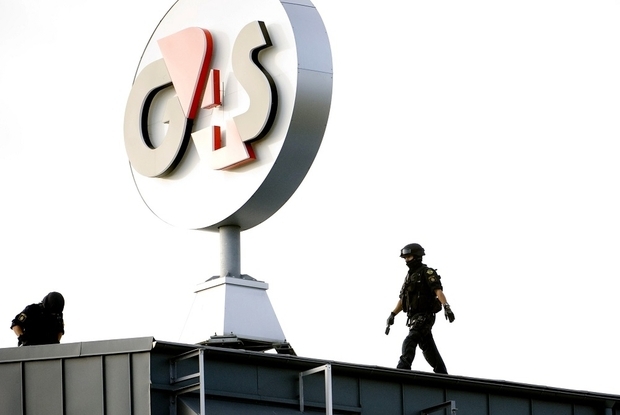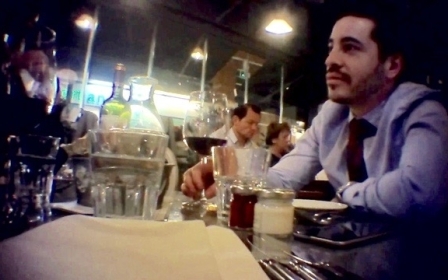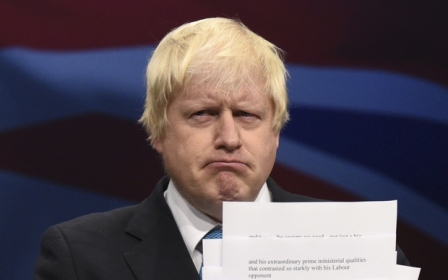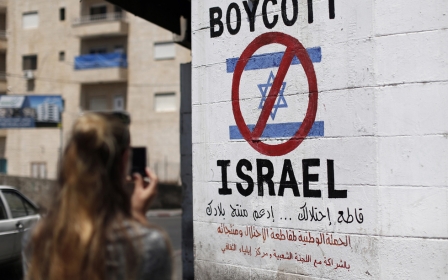Israeli embassy’s ‘take down’ tactics shouldn't distract from its crimes - and UK complicity
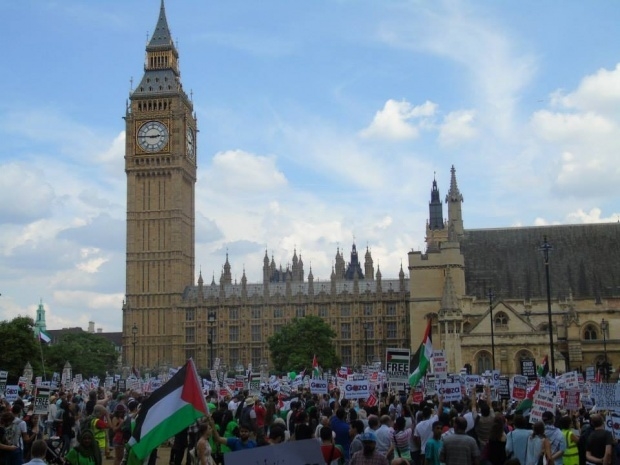
This week, an Al Jazeera undercover investigation is shining a light on "behind the scenes" activities of the Israeli government in the UK. The investigation exposes employees of the Israeli government trying to influence UK government policies and positions on Israel and working actively to suppress criticism of Israel’s violations of international law through its illegal settlements and military occupation in Palestine.
Ultimately, grassroots movements of justice-loving people will prevail over the desperate attempts of embassy officials to save the image of a criminal regime
The investigation also reveals how the Israeli embassy gave financial and other support to non-governmental organisations in order to manufacture "grassroots" support for the Israeli state, and to attack and undermine groups and individuals who voice criticism of Israel’s illegal policies.
In one instance, the Israeli embassy pointedly worked with officers in the National Union of Students to seed opposition to the democratically elected president, Malia Bouattia, because of her vocal support for justice for Palestinians.
READ: Stop glossing over the siege in Gaza and call it what it is: Genocide
Al Jazeera’s exposé is timely and highlights some important points. First: the UK government should never make decisions driven by the opinions of, or pressure from, the Israeli embassy, or any foreign embassy for that matter.
The UK government should always shape policy and practices according to international law, motivated by protection of human rights and democracy. This is not a "recommendation". It is an obligation.
Black ops
Second: the investigation shows how Shai Masot, a senior Israeli embassy political official who resigned earlier this week, was working on an agenda set by the Israeli Ministry of Strategic Affairs, headed by Gilad Erdan.
Erdan and his ministry made the news a few months ago for starting the notorious anti-Boycott, Divestment and Sanctions (BDS) task force, which invests tens of millions of pounds into targeting human rights activists involved in the BDS movement, in an effort to undermine our democratic rights and actions.
Put simply, it’s responsible for what Yossi Melman, Israeli security and intelligence commentator, calls "black ops" carried out on foreign soil.
Third: the BDS grassroots movement remains as important as ever, pressuring governments and institutions around the world to end their complicity in Israel’s oppression of Palestinians.
The Palestinian call for BDS (which came in 2005) has echoed powerfully around the world, with hundreds of thousands of people taking up the call, convincing their universities, trade unions, cultural and faith institutions to boycott and divest from companies complicit in Israel’s oppression of Palestinians.
This was only months after the American United Methodist Church declared the five largest Israeli banks off-limits for investment, French telecom giant Orange terminated its Israeli contracts, and Irish multinational CRH divested its share from the Israeli company supplying concrete for the Apartheid Wall.
These are just some of the most recent victories resulting from hard-fought public campaigns, in the face of apathetic governments.
Whether the UK government likes the BDS movement or not is irrelevant. What matters is that it must protect the rights of people in the UK to take action to hold our government and institutions accountable to international law (the EU and various states have already been explicit about the need to protect the rights of BDS activists).
Protecting our rights includes taking the necessary steps to ensure that foreign governments and agencies are not spying on, threatening, defaming or interfering with activists or our elected officials. Instead, the UK government has been facilitating these "black ops". This must end.
Beyond tactics
Fourth and finally: it’s clear that this story has significant consequences for the fight for justice in Palestine and warrants our attention. But it must not distract us from the real issue: Israel’s continued violations of Palestinian rights, and the UK government’s complicity in these crimes.
We must not lose sight of the wider context of a UK government that works hand in hand with arms companies, and an austerity regime that is driven by corporate interests
This complicity is exemplified through the UK-Israel arms trade, which has not slowed despite evidence showing that British-made weapons were used in war crimes during Israel’s 2014 bombardment of the Gaza Strip. The complicity is indisputable so long as the UK government continues to shirk its obligations under international treaties against torture and other war crimes.
The UK government knows that Israel holds 7,000 Palestinians as political prisoners, including 700 under administrative detention without charge or trial, in prisons where torture and ill-treatment are systematic. And yet still the government refuses to hold Israel to account.
This complicity is not simply a product of the covert lobbying conducted by the Israeli government through its embassy officials. Certainly, the Israeli embassy’s actions feed the repressive status quo, especially through the threats and defamation of those who dare to speak out.
But these actions are not the only factor at play. We must not lose sight of the wider context of a UK government that works hand in hand with arms companies and other war profiteers, and an austerity regime that is driven by corporate interests at the expense of those already suffering from poverty and inequality, in this country and abroad.
That’s why War on Want is active in the BDS movement; we see it as a part of our larger goal to achieve a vision of a just world, through our mission to fight against the root causes of poverty and human rights violation.
So while we join in with others raising alarm at these revelations, we know that the best way for us all to fight back is to continue our campaigns undeterred. Ultimately, the grassroots movements of justice-loving people will prevail over the desperate attempts of embassy officials to save the image of a criminal regime.
- Ryvka Barnard is senior campaigns officer on militarism and security at War on Want
The opinions expressed in this article are those of the author and do not necessarily reflect the editorial position of Middle East Eye.
Photo: Palestine solidarity activists marked Palestinian Prisoners’ Day on 17 April by protesting G4S in Glasgow, Manchester and London (AFP)
New MEE newsletter: Jerusalem Dispatch
Sign up to get the latest insights and analysis on Israel-Palestine, alongside Turkey Unpacked and other MEE newsletters
Middle East Eye delivers independent and unrivalled coverage and analysis of the Middle East, North Africa and beyond. To learn more about republishing this content and the associated fees, please fill out this form. More about MEE can be found here.



